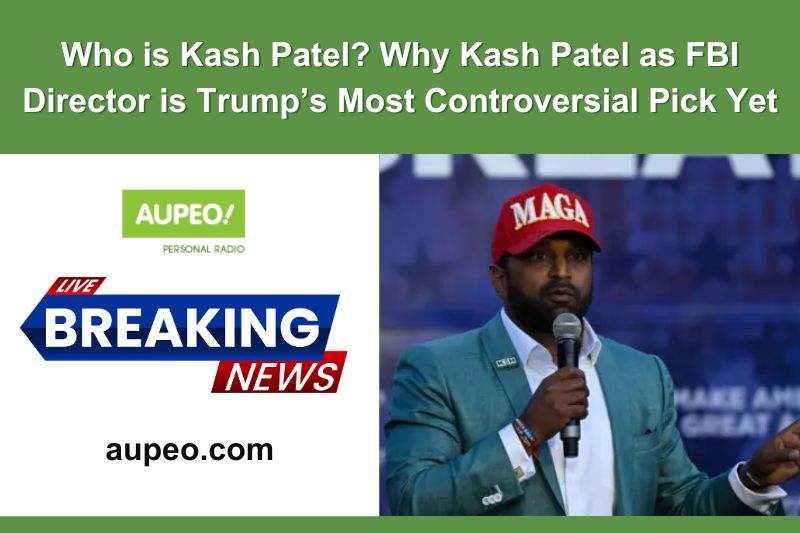Donald Trump’s choice to appoint Kash Patel as FBI director has sparked intense debate across political and public spheres.
Patel’s staunch loyalty to Trump and his plans to reshape federal law enforcement align closely with the MAGA agenda, but they also come with controversies and concerns.
In this article, we’ll examine who Kash Patel is, why Trump selected him, and the potential changes this move could bring to the FBI and the nation as a whole.
Whether you’re a political enthusiast or simply curious about the direction of federal law enforcement, let’s delve into the details.
Who is Kash Patel, and Why Has Donald Trump Chosen Him as FBI Director?

Donald Trump’s nomination of Kash Patel as FBI Director has sparked heated debates. Patel, a staunch Trump loyalist, is no stranger to controversy.
His career spans roles like an aide to former Congressman Devin Nunes and his infamous involvement in drafting the Nunes Memo, which criticized the FBI’s investigation into Russian election interference.
Why Patel? His unwavering dedication to Trump and alignment with the MAGA movement’s vision make him an ideal choice for Trump’s agenda.
Patel’s prior criticism of the “Deep State” and his readiness to restructure federal agencies further underline his appeal.
To explore more about Patel’s background, including his financial profile, check out how much Kash Patel is worth.
What Does Kash Patel’s Nomination Mean for the FBI?
The nomination of Kash Patel could signify a seismic shift in the FBI’s structure and focus. Patel has publicly advocated for purging “Deep State” operatives and transforming the FBI into an institution loyal to Trump’s ideology.
This raises questions about the FBI’s future independence. If Patel’s plans materialize, the FBI Hoover Building, which he suggested converting into a museum, may symbolize the end of an era.
Patel also aims to prosecute individuals he deems threats to Trump’s vision, including media critics.
Such ambitions highlight the growing tension between traditional federal agency operations and Trump’s MAGA priorities.
How Could Kash Patel’s Leadership Impact the Federal Government?
Patel’s leadership extends beyond the FBI. His agenda, shaped by government gangsters rhetoric, targets a broader federal restructuring.
His book, Government Gangsters: The Deep State, the Truth, and the Battle for Our Democracy, outlines a list of individuals in the federal system he views as obstacles.
His plans include:
- Prosecuting media figures accused of undermining Trump.
- Purging intelligence officials linked to investigations against Trump, including those from the Russia probe.
- Overhauling key agencies like the Department of Justice and the CIA.
Patel’s critics argue that such changes could erode public trust in government institutions, but his supporters see it as a necessary correction.
What Are the Controversies Surrounding Kash Patel?

Kash Patel’s career is marked by significant controversy. For instance, during the 2020 election, Patel allegedly misled Pentagon officials about approval for a SEAL Team 6 operation in Nigeria. Though the mission succeeded, it nearly led to an international crisis.
Patel also played a pivotal role in the Russia investigation counter-narrative, authoring the contentious Nunes Memo.
His actions have drawn criticism from figures like former CIA Director Gina Haspel, who threatened to resign over Patel’s rumored appointment in 2021.
Such controversies highlight the polarizing nature of his leadership style.
What Are the Broader Implications of Trump’s Pick for FBI Leadership?
Trump’s decision to nominate Kash Patel reflects a broader strategy to reshape the federal government. This move emphasizes loyalty and alignment with MAGA priorities over traditional qualifications or neutrality.
If Patel leads the FBI, it could pave the way for similar appointments across other agencies. This raises concerns about:
- Potential political interference in law enforcement.
- Increased partisanship in federal governance.
- A growing divide between MAGA supporters and critics.
The implications extend far beyond Patel’s nomination, potentially redefining the balance of power within the government.
How Are Key Entities and Stakeholders Reacting to Kash Patel’s Appointment?
Reactions to Patel’s nomination vary widely. Supporters within the MAGA movement view him as a necessary force for change.
On the other hand, former government officials, like Bill Barr, have publicly opposed Patel’s elevation to senior law enforcement roles.
Media outlets have also raised alarms, emphasizing the risks of politicizing the FBI. Despite this, Patel remains steadfast in his commitment to prosecuting what he terms “media conspirators.”
This divided response underscores the polarizing nature of Patel’s nomination.
What Does the Future Hold for the FBI Under Kash Patel?
If confirmed, Kash Patel could fundamentally alter the FBI’s mission and public perception. His plans to target Trump’s critics, overhaul agency structures, and prosecute media figures will likely face legal and institutional challenges.
However, his unwavering loyalty to Trump suggests that he will aggressively pursue his agenda.
The long-term impact on public trust in the FBI and other federal agencies remains uncertain.
Conclusion
Kash Patel’s nomination as FBI director has raised important questions about the future of law enforcement and government in the U.S. As we continue to analyze this unfolding story, share your thoughts or explore more content on aupeo.com.

